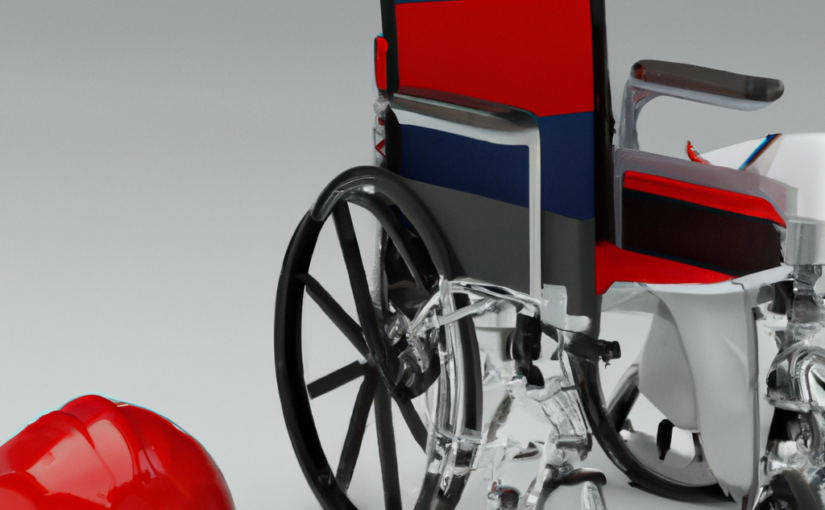Reading Time: 16 minutesFor purpose of major classifications, there are two types of Workers Comp disabilities: Temporary Disability and Permanent Disability. These are further broken down into four types of Disability Benefits for Workers’ Compensation.
Get Legal Help! Call Now for a FREE Consult with an Experienced Workers Comp Lawyer at 844–682‑0999.
- Temporary Total Disability. This is when an employee temporarily cannot perform any of their regular work duties while they are recovering
- Temporary Partial Disability. This is when the employee cannot work at all while recovering from the injury, requires a physician’s verification of disability.
- Permanent Total Disability. This a very severe injury or a very severe resulting physical limitation for an employee disabled as a result of an occupational injury or disease.
- Permanent Partial Disability. This a very severe injury or a very severe resulting physical limitation for an employee disabled as a result of an occupational injury or disease. However, the employee may be able to work in other jobs or gainful employment. Generally, loss of a limb is an example of this kind of disability.
Workers Comp Disabilities Goals
Policymakers generally agree that workers’ compensation benefits should be set at a level that would not cause undue financial pressure on a recovering worker but that would also not be a financial disincentive to return to work. In reality, all states have a maximum and usually a minimum amount per week they will pay, regardless of the workers’ earnings.
4 Types of Workers Comp Disabilities
Temporary Disability
Temporary Total Disability
The payment for lost wages in an occupationally related injury or disease usually begins with the payment of temporary total disability benefits. This benefit, which is paid when the employee cannot work at all while recovering from the injury, requires a physician’s verification of disability.
The weekly standard for the replacement of wages for temporary disability benefits, as recommended by the National Commission on State Workmen’s Compensation Laws (1972), is 66 2/3 percent of an employee’s gross wage or 80 percent of spendable earnings.
States’ actual weekly benefit replacement rates (commonly known as compensation rates) in 2003 varied from the 66 2/3 percent of gross wages paid by most states to a high of 70 percent (Oklahoma, Texas, and West Virginia) and a low of 60 percent (Massachusetts). The maximum weekly benefit amounts varied from 200 percent of the statewide average weekly wage (Iowa) to a low of 66 2/3 percent (Delaware and Mississippi). There is also a waiting period of 3, 5, or 7 days from first date of disability that is reimbursed if the employee is still disabled after a period of time. This retroactive period also varies tremendously across jurisdictions, from a 7‑day minimum in Connecticut to 4 weeks in Texas (Department of Labor 2003).
Temporary Partial Disability
An employee who can work but with physical limitations (such as no lifting over 10 pounds repeatedly) while recovering may go back to work with “reasonable accommodations” made to the job or may do a different job, one that has duties within his or her physical abilities.
If the employee is paid less for the reasonably accommodated position or works fewer hours, he or she will have a continuing wage loss even while working and will be entitled to temporary partial disability benefits.
Those benefits are paid when an employee has been released to work but has physician-directed physical limitations and loses wages as a result. In these situations, the employee is usually working at a different job that pays less than the job at the time of injury, is working fewer hours, or is looking for employment within his or her physical limitations.
Temporary partial disability benefits are generally calculated as a percentage of the difference between what the employee was making when originally injured and what he or she is able to earn with the physical limitations. In general, temporary partial disability benefits under workers’ compensation and Disability Insurance benefits under Social Security would generally not be paid simultaneously, because the payment of temporary partial disability benefits indicates the employee is not totally disabled.
Both temporary total disability and temporary partial disability benefits are generally paid while the employee is in active medical treatment and while healing from an injury. These benefits will continue until
- the worker is released to return to work without any physical limitations,
- the worker is earning the same wage as when injured,
- the worker has been paid benefits for the number of weeks allowed by statute for that category of benefit, or
- a “trier of facts” determines that the worker is no longer eligible for those benefits.
Some states limit the payment of temporary benefits to a combined 104, 156, or 400 weeks (Florida, Massachusetts, and Tennessee, respectively, for example), and some allow these benefits to continue for up to 11 years (Pennsylvania) or without limitation (Illinois) (Department of Labor 2003).
After an employee returns to work or reaches the maximum temporary benefits payable under the applicable workers’ compensation statute, he or she may then be eligible for some type of permanent benefit.
Permanent Disability
The concept of replacing 66 2/3 percent of a person’s gross wages or 80 percent of their spendable earnings is fairly easy to understand and apply when people are disabled for short periods of time.
However, in most jurisdictions, once a physician has stated that additional medical treatment will not result in further physical recovery (a concept known as maximum medical improvement or the end of the healing period), each system has a mechanism to determine what further benefits are due when a worker has a permanent loss of physical function and therefore will presumably have a permanent loss of future earnings.
As with temporary benefits, there are two separate kinds of permanent benefits available under most workers’ compensation statutes: permanent total disability and permanent partial disability.
Permanent Total Disability
These benefits are the less complicated of the two to explain and are the most similar to Social Security Disability Insurance benefits. Their payment in workers’ compensation cases reflects either a very severe injury or a very severe resulting physical limitation for an employee disabled as a result of an occupational injury or disease.
Many statutes have a specific listing of conditions that create a presumption of entitlement to permanent total disability benefits. Such conditions commonly include the loss of both legs, both arms, or both eyes.
Individuals with other conditions may be eligible if they have a specific percentage of disability as rated by a physician. For example, the Florida statute (440.15) lists the following conditions that must be present for an individual to be presumed permanently totally disabled: spinal cord injury involving severe paralysis of an arm, a leg, or the trunk; amputation of an arm, a hand, a foot, or a leg involving the effective loss of use of that appendage; severe brain or closed-head injury (which is further defined); second- or third-degree burns of 25 percent or more of the total body surface or third-degree burns of 5 percent or more to the face and hands; or total or industrial blindness.
In all other cases, the statute requires the employee to establish that because of a physical limitation he or she is not able to engage in at least sedentary employment within a 50-mile radius of the employee’s residence.
In the majority of states, permanent total disability benefits are paid at the same rate as those for temporary total disability, again subject to the state’s maximum and minimum benefit provisions. A number of states also have automatic cost-of-living escalators that increase the employees’ permanent total disability benefit annually. In other states, the cost-of-living escalator is legislatively implemented, paid by a state fund, or both.
In most states, permanent total disability benefits are payable until death or return to work as long as the disability continues, but in a number of states benefits may be capped at a dollar amount or a number of weeks or may be paid only until a certain age is reached. For example, Kansas caps the total amount payable at $125,000 and Mississippi at $148,977; Indiana limits benefits to 500 weeks; Minnesota has a rebuttable presumption that permanent total disability benefits cease at age 67; and West Virginia stops paying those benefits when the employee reaches the age of eligibility for Social Security old-age and survivor benefits (Department of Labor 2003). Although one may think the entitlement to permanent total disability benefits means an employee will never work again, many states are open to reconsidering employment at times during the employee’s ongoing disability benefits. In addition, most insurance companies will do semiannual or annual activity checks to determine whether the employee is working or able to work. With today’s technology and increased medical diagnostics and procedures, individuals who once may have been considered permanently disabled may be able to work again. This is one reason why it is becoming more important for disability systems to coordinate their efforts at reemployment.
Permanent Partial Disability
These benefits are much more complicated and diverse in both their design and application. A number of excellent books have been written on the subject, explaining how different states attempt to pay future lost earnings to workers who have permanent physical limitations due to their on-the-job illnesses (see Berkowitz and Burton 1987; Barth and Niss 1999). The challenge in designing a benefit for the payment of future lost earnings for workers who can still work but have a permanent physical limitation entails
- finding a method of determining permanent partial disability benefits that is easy to understand and calculate to reduce administrative costs and disputes over the entitlement or the amount of entitlement;
- finding a method that produces equitable and adequate benefits for the losses suffered by workers; and
- reaching political agreement on what future earnings loss is the result of the injury and should therefore be paid by employers and how much may result from other factors and should not be the employer’s direct responsibility.
A thorough discussion of how states attempt to meet these challenges is beyond the scope of this article. What is important, however, is that determining entitlement to and the amount of permanent partial disability benefits in workers’ compensation systems is not an exact science, and the entitlement and amounts to be paid are often in dispute. This creates one additional area in which the employer and employee may settle the dispute with a lump-sum payment without specifying exactly how the amount was calculated. This uncertainty makes the determination of the appropriate offset amount for Social Security Disability Insurance benefit very complicated. It is also becoming apparent that state systems are not doing a very good job of designing permanent partial disability systems to compensate for a worker’s future wage loss, regardless of the type of system being used (see Boden and Galizzi 1999; Biddle 1998; Reville and others 2001a; Reville and others 2001b; and Reville, Schoeni, and Martin 2001).
In general, jurisdictions handle the payment of nonscheduled permanent partial disability benefits (ones not specifically itemized in the statute) in one of four ways and base it on physical impairment (the physiological and psychological loss), disability (the economic and social consequences), or a combination of the two (Barth and Niss 1999).
- The impairment approach looks only at the actual physical and psychological loss produced by the injury or illness. The impairment rating is usually made by a health care provider using a version of the American Medical Association’s Guides to the Evaluation of Permanent Impairment or a similar guide.
- The loss-of-earning-capacity approach estimates the workers’ future wage loss using such factors as the worker’s age, education, training, skills, and degree of impairment and the existing labor market conditions.
- The wage-loss approach uses a calculation of the worker’s actual weekly wage losses. The calculation is based on the difference between what the employee is able to earn with a permanent disability and what he or she was able to earn at the time of the injury.
- The bifurcated approach uses a combination of the above approaches based on whether the employee returns to employment or not. Workers who have returned to work at or near the wages they earned at the time of the injury receive a payment based on impairment, and those who do not return to work receive a payment based on a loss of earning capacity.
Source: https://www.ssa.gov/policy/docs/ssb/v65n4/v65n4p7.html
Workers Comp Disability and Compensation
Degree of Disability Scale in Workers Comp
The degree of disability scale in workers’ compensation is a system used to measure the severity of a worker’s injury. The scale ranges from 0% to 100%, with 0% representing no disability and 100% representing total disability. The degree of disability is used to determine the amount of benefits that a worker is entitled to.
The degree of disability is determined by a doctor who specializes in workers’ compensation. The doctor will evaluate the worker’s injury and their ability to work. The doctor will also consider the worker’s age, education, and work experience.
The degree of disability is not always easy to determine. There are many factors that can affect the severity of an injury, and it can be difficult to predict how an injury will affect a worker’s ability to work in the future.
If you have been injured on the job, you should contact your employer or your state’s workers’ compensation agency to file a claim. You will need to provide information about your injury, your medical treatment, and your ability to work. A doctor will then evaluate your injury and determine the degree of your disability.
The amount of benefits that you are entitled to will depend on the degree of your disability. If you are 100% disabled, you may be entitled to a monthly pension for the rest of your life. If you are less than 100% disabled, you may be entitled to a lump sum of money or to weekly payments.
You should contact an attorney if you have any questions about workers’ compensation. An attorney can help you file a claim, understand your rights, and fight for the benefits you deserve.
What is Workers’ Comp Disability Rating Calculator
A workers’ comp disability rating calculator is a tool that can be used to estimate the severity of a worker’s injury and the amount of benefits that the worker may be entitled to. The calculator typically asks the user to provide information about the injury, such as the type of injury, the severity of the injury, and the worker’s ability to work. The calculator then uses this information to calculate a disability rating, which is a percentage that represents the severity of the injury.
The disability rating is used to determine the amount of benefits that the worker may be entitled to. In most states, workers who are 50% or more disabled are entitled to permanent disability benefits. The amount of benefits that a worker receives will depend on the state in which they live, the severity of their injury, and their wage.
It is important to note that workers’ comp disability rating calculators are not always accurate. The results of the calculator should be used as a starting point, and the worker should consult with an attorney to discuss their specific case.
Here are some of the most popular workers’ comp disability rating calculators:
- The National Council on Compensation Insurance (NCCI) Disability Rating Calculator is a free calculator that can be used to estimate the severity of a worker’s injury and the amount of benefits that the worker may be entitled to. The calculator is available in English and Spanish.
- The Workers’ Compensation Research Institute (WCRI) Disability Rating Calculator is a free calculator that can be used to estimate the severity of a worker’s injury and the amount of benefits that the worker may be entitled to. The calculator is available in English and Spanish.
- The American Bar Association (ABA) Workers’ Compensation Law and Policy Center Disability Rating Calculator is a free calculator that can be used to estimate the severity of a worker’s injury and the amount of benefits that the worker may be entitled to. The calculator is available in English only.
Workers’ Comp Benefits and Degree of Disability
If you have been injured on the job, you should contact your employer or your state’s workers’ compensation agency to file a claim. You will need to provide information about your injury, your medical treatment, and your ability to work. A doctor will then evaluate your injury and determine the degree of your disability.
The amount of benefits that you are entitled to will depend on the degree of your disability. If you are 50% or more disabled, you may be entitled to permanent disability benefits. The amount of benefits that a worker receives will depend on the state in which they live, the severity of their injury, and their wage.
You should contact an attorney if you have any questions about workers’ compensation and your degree of disability. An attorney can help you file a claim, understand your rights, and fight for the benefits you deserve.
What is Workers’ Comp Disability Settlement
A workers’ comp disability settlement is an agreement between an injured worker and their employer or their employer’s insurance company, in which the worker agrees to give up their right to future workers’ compensation benefits in exchange for a lump sum of money.
Workers’ compensation settlements can be a good option for workers who have been injured on the job and who are unable to return to work. Settlements can provide workers with the financial resources they need to pay for medical expenses, lost wages, and other expenses.
However, there are some risks associated with workers’ comp settlements. Workers who agree to a settlement may give up their right to future benefits, even if their condition worsens. Additionally, workers may not be able to get as much money in a settlement as they would if they went through the workers’ compensation process.
If you are considering a workers’ comp settlement, you should talk to an attorney to discuss your options. An attorney can help you understand the risks and benefits of a settlement and can negotiate on your behalf to get you the best possible deal.
Here are some of the factors that may affect the amount of a workers’ comp disability settlement:
- The severity of the injury
- The worker’s age and education
- The worker’s ability to return to work
- The worker’s wage
- The state in which the worker lives
If you have been injured on the job, you should contact your employer or your state’s workers’ compensation agency to file a claim. You will need to provide information about your injury, your medical treatment, and your ability to work. A doctor will then evaluate your injury and determine the degree of your disability.
If you are unable to return to work, you may be entitled to workers’ compensation benefits. These benefits can include medical expenses, lost wages, and vocational rehabilitation.
You may also be able to negotiate a workers’ comp disability settlement with your employer or their insurance company. A settlement can provide you with a lump sum of money that can help you pay for medical expenses, lost wages, and other expenses.
If you are considering a workers’ comp settlement, you should talk to an attorney to discuss your options. An attorney can help you understand the risks and benefits of a settlement and can negotiate on your behalf to get you the best possible deal.
Frequently Asked Questions on Workers Comp Disability
What Pays More Workers’ Comp Or Disability
Workers’ compensation and disability insurance are both types of insurance that can provide financial assistance to people who are unable to work due to an injury or illness. However, there are some key differences between the two types of insurance that can affect the amount of benefits that you receive.
Workers’ compensation is a type of insurance that is required by law in most states. It is paid for by employers, and it provides benefits to employees who are injured or become ill on the job. Workers’ compensation benefits typically include medical expenses, lost wages, and death benefits.
Disability insurance is a type of insurance that is purchased by individuals or employers. It provides benefits to people who are unable to work due to an injury or illness, regardless of whether the injury or illness was caused by work. Disability insurance benefits typically include monthly payments, lump-sum payments, and death benefits.
In general, workers’ compensation benefits are more generous than disability insurance benefits. This is because workers’ compensation benefits are paid for by employers, and employers have a financial incentive to provide generous benefits in order to reduce the risk of lawsuits.
Disability insurance benefits, on the other hand, are paid for by individuals or employers, and there is no such financial incentive.
However, there are some cases in which disability insurance benefits may be more generous than workers’ compensation benefits. For example, disability insurance benefits may be available for longer periods of time than workers’ compensation benefits. Additionally, disability insurance benefits may not be subject to the same restrictions as workers’ compensation benefits. For example, disability insurance benefits may not be affected by the worker’s ability to return to work in a modified capacity.
Ultimately, the amount of benefits that you receive will depend on the specific terms of your workers’ compensation or disability insurance policy. If you are unsure about which type of insurance is right for you, you should speak with an insurance agent.
What are the 4 Classes of disability?
The four classes of workers’ compensation disability are: temporary total disability, temporary partial disability, permanent partial disability, and permanent total disability. Temporary total disability is when the employee is unable to work for a period of time due to their injury or illness. Temporary partial disability is when the employee is able to work, but is limited in their ability to perform certain tasks. Permanent partial disability is when the employee has a permanent disability, but is still able to perform some work. Permanent total disability is when the employee is permanently and totally disabled and unable to work.
What 4 types of issues are not covered by workers compensation?
- Intentional injuries caused by the employer.
- Self-inflicted injuries.
- Injuries caused by the employee’s intoxication.
- Injuries resulting from the employee’s willful refusal to use safety devices.
Which type of disability is the most common type for work related injuries?
The most common type of disability for work-related injuries is temporary total disability. This is when the employee is unable to work for a period of time due to their injury or illness.
What are types of disability losses?
Types of disability losses include lost wages, medical expenses, vocational rehabilitation costs, and death benefits. Depending on the severity of the injury or illness, the employee may also be eligible for additional benefits.
Have You’ve Been Injured on the Job?
No Obligation — Confidential — FREE CONSULT
844–682‑0999
Call Now
NO WIN — NO PAY
What is degree of disability scale?
The degree of disability scale is a system used to measure the severity of a disability. The scale ranges from 0 to 100 and is based on the extent of an individual’s loss of function as a result of their injury or illness. The higher the number, the more severe the disability.
What pays more Workers’ Comp or Disability?
In general, workers’ compensation benefits are usually higher than disability benefits. This is because workers’ compensation benefits are intended to replace lost wages and other expenses related to a work-related injury or illness. Disability benefits, on the other hand, are intended to replace lost wages and other expenses related to an individual’s overall disability.
What is Temporary Total Disability Settlement?
A temporary total disability settlement is a lump sum paid to a claimant as compensation for lost wages and other expenses related to a work-related injury or illness. The amount of the settlement is based on the extent of the claimant’s injury or illness and the amount of time they were unable to work. The settlement is typically paid out over a period of time, rather than in a single lump sum.
What are types of Workers’ Compensation Insurance
There are two types of workers’ compensation insurance: employer-provided insurance and state-funded insurance. Employer-provided insurance is purchased by the employer to cover their employees in the event of a work-related injury or illness. State-funded insurance is provided by the state and covers all employees in the state who are not covered by employer-provided insurance.
What is Workers’ Comp Disability Rating Calculator?
Workers’ comp disability rating calculator is a tool used to calculate the amount of disability benefits a worker may be entitled to receive. It takes into consideration the type of injury, the length of time the worker has been off work, and other factors, such as the worker’s age, job and salary. The calculator can be used to determine the amount of benefits a worker may receive, as well as the duration of time for which the benefits will be paid.
What is workers’ comp disability settlement?
Workers’ comp disability settlement is an agreement between an injured worker and their employer or their employer’s insurance company in which the worker agrees to accept a certain amount of compensation in exchange for not pursuing a workers’ compensation claim. The amount of compensation is typically based on the severity of the injury and the projected future costs of the injury, including medical costs and lost wages.
How long does it take to Settle a Workers’ Comp Claim?
The length of time it takes to settle a workers’ comp claim can vary widely depending on the complexity of the case, the amount of evidence and documentation required, and the willingness of the parties to negotiate. Generally, settlements can take anywhere from a few weeks to several months.
Do the Insurance Company Offer Settlement Offer?
Insurance companies do offer workers’ comp disability settlements, but it is ultimately up to the employer or the insurance company to decide whether or not to offer a settlement.
What is Monopolistic State Fund insurance and Which States Offer it?
Monopolistic State Fund insurance is a type of workers’ compensation insurance that is offered by a state-run insurance fund. The state fund is the exclusive provider of workers’ compensation insurance in the state, and offers coverage to employers and employees who do not have access to private insurance. The rates and benefits offered by the state fund are regulated by the state and are usually not as competitive as those offered by private insurance companies. The states that offer Monopolistic State Fund insurance are Alaska, California, Ohio, Washington, and Wyoming.
Why Do Employers Need Workers Compensation?
Employers need workers’ compensation insurance to protect themselves from the financial burden of having to pay medical expenses, lost wages, and other costs associated with employee injury or illness. Workers’ compensation insurance provides financial security to employees and their families in the event of a workplace injury or illness, and provides employers with protection against lawsuits due to workplace injury or illness. In addition, workers’ compensation insurance helps employers maintain a safe workplace by incentivizing employers to invest in workplace safety measures, as any accidents or injuries that do occur can be covered by the insurer.
Why Do Workers Comp Rules And Regulations Vary Between States?
Workers’ comp rules and regulations vary between states due to the differences in state laws and policies. Each state has its own set of rules and regulations for workers’ compensation, which are designed to protect employees and employers alike. For example, some states may have different eligibility requirements for receiving workers’ compensation benefits, while others may have different benefits caps. Additionally, some states may require employers to provide workers’ compensation insurance, while other states may allow employers to opt out of coverage.
What are the Basic Requirements for filing a Workers’ Comp Claim?
The basic requirements for filing a workers’ compensation claim in the United States are as follows:
- The injury must arise out of and in the course of employment.
- The employee must notify the employer of the injury or illness within a certain period of time.
- The employee must provide the employer with proof of the injury or illness, such as medical documentation.
- The employee must file a claim for benefits with the workers’ compensation insurance company or state agency responsible for administering workers’ compensation benefits.
- The employee must follow the procedures for appealing a denied claim.
Related searches
- degree of disability scale
- what pays more workers’ comp or disability
- temporary total disability settlement
- types of workers’ compensation insurance
- workers’ comp disability rating calculator
- workers’ comp disability settlement
#Amazon #AppealsProcess #BackToWorkAfterInjury #Calculators #ClaimsDenied #ConstructionWorkersCompensation #DeathBenefits #Employers #FloridaWorkersCompBenefits #FreeConsult #IndependentContractors #InjuredAtWork #InsuranceForWorkersComp #LawsIn50States #Lawyer #MedicalBenefits #NJLaws #OccupationalInjuries #OregonWorkersCompBenefits #OSHA #PermanentBenefits #RehireAfterInjury #RepetitiveMotionInjuries #Rights #SocialSecurity #TemporaryBenefits #TennesseeWorkersComp #TransportationWorkers #USDepartmentOfLabor #WorkersCompBenefits #WorkersCompClaims #WorkersCompDisabilityClaims #WorkersCompensationLaws #WorkersCompRights #WorkInjuryTerms








